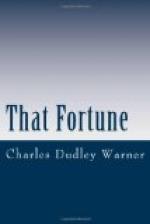Celia had been brought to Rivervale by her mother about a year before this time, and the two occupied a neat little cottage in the village, distinguished only by its neatness and a plot of syringas, and pinks, and marigolds, and roses, and bachelor’s-buttons, and boxes of the tough little exotics, called “hen-and-chickens,” in the door-yard, and a vigorous fragrant honeysuckle over the front porch. She only dimly remembered her father, who had been a merchant in a small way in the city, and dying left to his widow and only child a very moderate fortune. The girl showed early an active and ingenious mind, and an equal love for books and for having her own way; but she was delicate, and Mrs. Howard wisely judged that a few years in a country village would improve her health and broaden her view of life beyond that of cockney provincialism. For, though Mrs. Howard had more refinement than strength of mind, and passed generally for a sweet and inoffensive little woman, she did not lack a certain true perception of values, due doubtless to the fact that she had been a New England girl, and, before her marriage and emigration to the great city, had passed her life among unexciting realities, and among people who had leisure to think out things in a slow way. But the girl’s energy and self-confidence had no doubt been acquired from her father, who was cut off in mid-career of his struggle for place in the metropolis, or from some remote ancestor. Before she was eleven years old her mother had listened with some wonder and more apprehension to the eager forecast of what this child intended to do when she became a woman, and already shrank from a vision of Celia on a public platform, or the leader of some metempsychosis club. Through her affections only was the child manageable, but in opposition to her spirit her mother was practically powerless. Indeed, this little sprout of the New Age always spoke of her to Philip and to the Maitlands as “little mother.”




